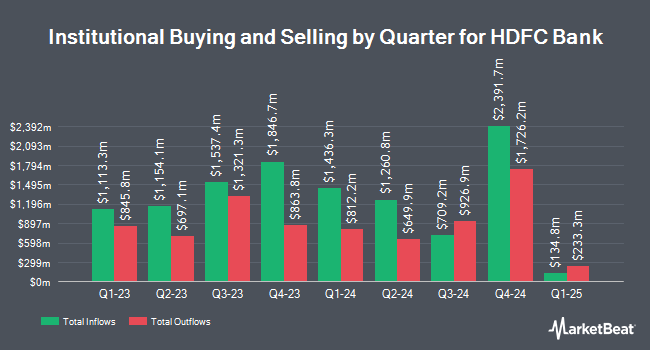Mackenzie Financial Corp trimmed its stake in HDFC Bank Limited (NYSE:HDB - Free Report) by 0.6% during the fourth quarter, according to its most recent filing with the Securities & Exchange Commission. The fund owned 945,884 shares of the bank's stock after selling 5,275 shares during the quarter. Mackenzie Financial Corp's holdings in HDFC Bank were worth $60,404,000 at the end of the most recent quarter.
A number of other institutional investors and hedge funds also recently modified their holdings of the stock. Northern Trust Corp boosted its position in shares of HDFC Bank by 52.0% in the 4th quarter. Northern Trust Corp now owns 1,015,588 shares of the bank's stock valued at $64,855,000 after purchasing an additional 347,488 shares during the period. Tudor Investment Corp ET AL acquired a new position in shares of HDFC Bank during the 4th quarter worth about $580,000. US Bancorp DE grew its holdings in shares of HDFC Bank by 12.7% during the 4th quarter. US Bancorp DE now owns 157,665 shares of the bank's stock worth $10,068,000 after purchasing an additional 17,800 shares in the last quarter. Bank Julius Baer & Co. Ltd Zurich acquired a new position in HDFC Bank in the fourth quarter worth about $2,907,000. Finally, Ovata Capital Management Ltd boosted its stake in shares of HDFC Bank by 89.7% in the 4th quarter. Ovata Capital Management Ltd now owns 690,320 shares of the bank's stock valued at $43,863,000 after purchasing an additional 326,400 shares in the last quarter. 17.61% of the stock is owned by institutional investors and hedge funds.
HDFC Bank Stock Up 0.7%
Shares of NYSE:HDB traded up $0.55 during mid-day trading on Thursday, reaching $74.69. 2,334,593 shares of the stock were exchanged, compared to its average volume of 2,827,392. The stock's 50 day simple moving average is $70.10 and its 200-day simple moving average is $65.01. HDFC Bank Limited has a one year low of $55.00 and a one year high of $75.37. The company has a quick ratio of 0.09, a current ratio of 0.09 and a debt-to-equity ratio of 1.26. The company has a market cap of $189.13 billion, a P/E ratio of 22.70, a P/E/G ratio of 2.12 and a beta of 0.63.
HDFC Bank (NYSE:HDB - Get Free Report) last released its quarterly earnings data on Saturday, April 19th. The bank reported $0.85 earnings per share for the quarter, topping the consensus estimate of $0.74 by $0.11. HDFC Bank had a net margin of 14.64% and a return on equity of 12.19%. The company had revenue of $5.04 billion for the quarter, compared to analyst estimates of $434.68 billion. As a group, equities research analysts predict that HDFC Bank Limited will post 3.03 EPS for the current year.
Analysts Set New Price Targets
Separately, Wall Street Zen raised HDFC Bank from a "sell" rating to a "hold" rating in a research note on Wednesday, May 14th.
Get Our Latest Stock Analysis on HDB
About HDFC Bank
(
Free Report)
HDFC Bank Limited provides banking and financial services to individuals and businesses in India, Bahrain, Hong Kong, and Dubai. The company operates in three segments: Wholesale Banking, Retail Banking, and Treasury Services. It accepts savings, salary, current, rural, public provident fund, pension, and demat accounts; fixed and recurring deposits; and safe deposit lockers, as well as offshore accounts and deposits, and overdrafts against fixed deposits.
Recommended Stories

Before you consider HDFC Bank, you'll want to hear this.
MarketBeat keeps track of Wall Street's top-rated and best performing research analysts and the stocks they recommend to their clients on a daily basis. MarketBeat has identified the five stocks that top analysts are quietly whispering to their clients to buy now before the broader market catches on... and HDFC Bank wasn't on the list.
While HDFC Bank currently has a Buy rating among analysts, top-rated analysts believe these five stocks are better buys.
View The Five Stocks Here
Almost everyone loves strong dividend-paying stocks, but high yields can signal danger. Discover 20 high-yield dividend stocks paying an unsustainably large percentage of their earnings. Enter your email to get this report and avoid a high-yield dividend trap.
Get This Free Report
Like this article? Share it with a colleague.
Link copied to clipboard.